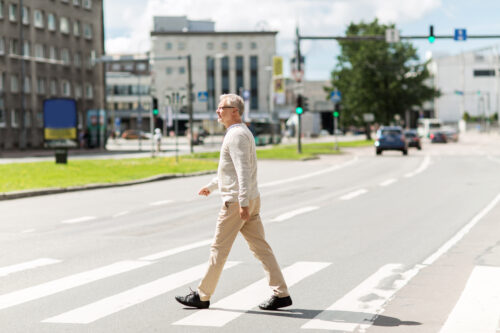
While walking rather than driving may appear to be a safer, more environmentally conscious mode of transportation, it does not come without risks. Although both motorists and pedestrians are legally obligated to abide by the rules of the road, many fail to uphold their legal responsibility to one another, jeopardizing the safety of the roadway. When pedestrians do not adhere to traffic laws, it increases the likelihood of accidents. As such, accident victims often wonder whether they can file a personal injury claim if they were jaywalking at the time of the accident. Please continue reading to learn how jaywalking can affect your accident claim and discover how a trusted Middlesex County Pedestrian Accident Attorney can help you fight for the just compensation you are entitled to.
What is jaywalking?
Jaywalking refers to the illegal act of pedestrians crossing or walking in the street outside the designated areas. Pedestrians are legally required to obey traffic signals and use crosswalks where they exist. If a marked or unmarked crosswalk is unavailable, pedestrians may cross the roadway at the nearest intersection at a right angle after yielding to oncoming traffic. Crosswalks were designed to keep vulnerable road users, such as pedestrians, safe.
When pedestrians fail to use marked and unmarked crosswalks on the roadway, they increase the likelihood of collisions. Pedestrian accidents are particularly devastating as pedestrians have little to no outside protection that can shield them from the impact of being struck by a vehicle. Due to how vulnerable pedestrians are on the road, New Jersey enforces strict jaywalking laws. Therefore, when pedestrians do not obey a pedestrian signal or do not use a crosswalk at a signalized intersection, they can be subject to a fine.
Can I file a lawsuit if I was hit by a car while jaywalking?
If you have been struck by a vehicle while jaywalking, you are likely concerned that your right to compensation for your damages has diminished. However, despite jaywalking being an unlawful act, depending on the specific circumstances of the accident, you can still claim damages. New Jersey follows a modified comparative negligence system. Essentially, this rule stipulates that accident victims can still collect compensation for their losses if they are partially at fault for the cause of a crash.
If you are found more than 50% at fault for the cause of the accident, you will be disentitled to gain compensation for your injuries. However, you can be awarded damages if your fault degree is below 51%, but the award you are entitled to receive will be reduced in proportion to your degree of fault. Under modified comparative negligence rules, liability is shared as damages are distributed in proportion to how much each party is at fault for the collision. That said, as long as you can prove that the driver’s negligence also contributed to the cause of the accident, you can file a personal injury claim to seek monetary compensation for your losses.
If you have been struck by a vehicle while jaywalking, contact a skilled attorney from Stathis & Leonardis, who can help you investigate the circumstances of the accident to determine fault.
